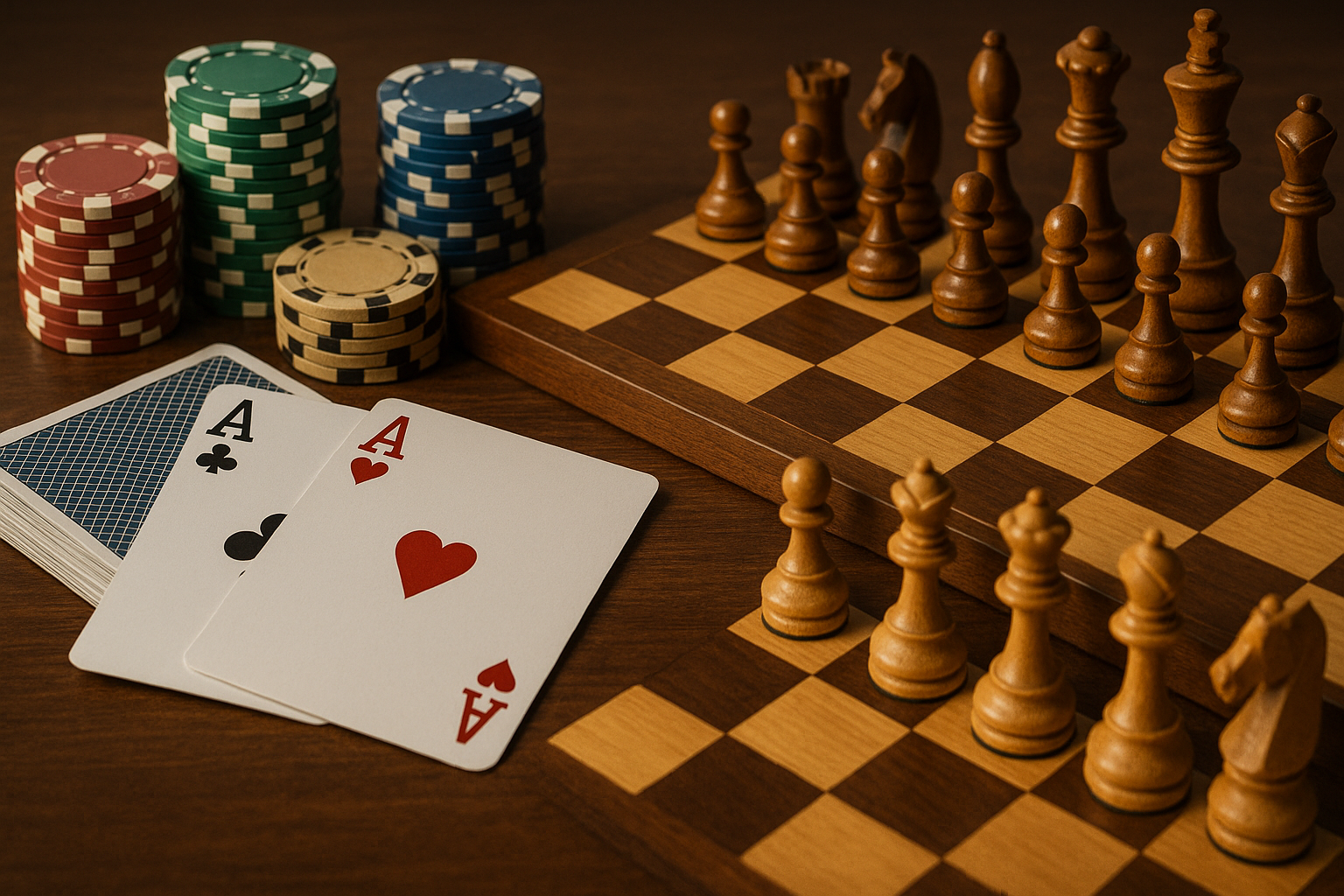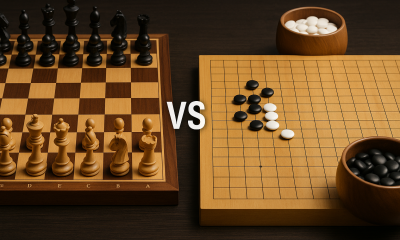Poker
Poker và Cờ vua: So sánh về Chiến lược và Kỹ năng

Cả poker và cờ vua đều là những trò chơi chiến thuật sâu sắc với cộng đồng tận tâm, hàng thập kỷ lý thuyết và đội ngũ chuyên gia đẳng cấp thế giới. Tuy nhiên, chúng thử thách những năng lực nhận thức rất khác nhau. Tướng là một trò chơi tính toán, nhận dạng mẫu và lập kế hoạch dài hạn hoàn hảo, có tính xác định. Poker (ví dụ, No-Limit Texas Hold'em) là một trò chơi thông tin không hoàn hảo, ngẫu nhiên, đòi hỏi suy luận, quản lý rủi ro và tâm lý. Để thành thạo cả hai đòi hỏi sự học hỏi nghiêm túc, nhưng sự đa dạng trong poker và sự rõ ràng trong tổ hợp trong cờ vua dẫn đến những con đường riêng biệt của kỹ năng đã được chứng minh.
Nếu bạn đã đọc sự tương phản giữa cờ vua và cờ vây, hãy xem Cờ vua so với cờ vây để thấy một khía cạnh khác của việc so sánh chiến lược.
1. Cấu trúc và thông tin trò chơi
Thông tin Hoàn hảo và Không hoàn hảo
Trong cờ vua, mọi quân cờ và ô cờ đều hiển thị rõ ràng cho cả hai người chơi—không có thông tin ẩn nào. Trong poker, bài tẩy và thứ tự chia bài của cộng đồng đều bị ẩn đi, tạo ra sự không chắc chắn trong việc ra quyết định.
Chủ nghĩa quyết định so với phương sai
Cờ vua mang tính quyết định: những nước đi giống nhau luôn dẫn đến cùng một kết quả. Trong poker, tính ngẫu nhiên từ việc chia bài tạo ra sự khác biệt - vì vậy ngay cả những ván bài hoàn hảo cũng có thể thua.
Cân bằng và Khai thác
Trong lý thuyết poker, các chiến lược **Tối ưu Lý thuyết Trò chơi (GTO)** cung cấp một cơ sở vững chắc, nhưng lợi nhuận thực sự đến từ việc khai thác điểm yếu của đối thủ. Các hướng dẫn như tại Poker ngược dạy cách kết hợp GTO và trò chơi khai thác.
2. Kỹ năng trông như thế nào
Các giao thoa cốt lõi:
- Nhận dạng mẫu
- Lập kế hoạch chiến lược theo thời gian
- Tính toán trong giới hạn
- Kiểm soát cảm xúc và kỷ luật
- Nghiên cứu lặp đi lặp lại và phản hồi
Cờ vua nhấn mạnh vào độ chính xác và giảm thiểu sai sót. Poker nhấn mạnh vào lý luận Bayes, tư duy dựa trên phạm vi và khả năng ra quyết định trong điều kiện không chắc chắn.
3. Quy trình ra quyết định
Cờ vua: Chiến thuật & Phương pháp luận
Việc ra quyết định trong cờ vua xoay quanh các chiến thuật bắt buộc—cờ đôi, cờ ghim, cờ xiên, tấn công phát hiện—và các phương pháp suy luận vị trí. Một cái nhìn tổng quan về lịch sử phát triển của cờ vua có sẵn trên Các trang lịch sử của Chess.com.
Poker: Tỷ lệ cược, vốn chủ sở hữu và phạm vi
Quyết định chơi poker sử dụng tỷ lệ cược pot, tỷ lệ cược ngụ ý và tỷ lệ fold equity. Bạn đặt đối thủ vào một khoảng bài và ước tính tỷ lệ thắng. Các khái niệm như hù dọa và cân bằng được mô tả trong bài viết “Giải thích về kỹ thuật Bluff trong Poker".
4. Thời gian, áp suất và động lực
Cờ vua sử dụng các điều khiển thời gian cố định (cổ điển, nhanh, chớp nhoáng). Khó khăn về thời gian buộc phải đánh đổi giữa chiều sâu và sự an toàn. Áp lực trong poker xuất phát từ việc tăng mù, sự biến động của bàn chơi và sức bền trong những ván chơi dài.
5. Tâm lý học & Mô hình đối thủ
Trong cờ vua, yếu tố tâm lý chỉ là thứ yếu—nỗ lực phải dựa trên giá trị kỹ thuật. Trong poker, tâm lý là trọng tâm: hình ảnh, dấu hiệu, thời điểm và độ nghiêng là không thể thiếu. Nội dung chiến lược của Upswing đề cập đến những yếu tố tâm lý này.
6. Công cụ đào tạo & Phương pháp học tập
Bộ cờ vua luyện tập
- Phân tích động cơ (Stockfish, Leela Chess Zero)
- Cơ sở dữ liệu mở & lý thuyết
- Bài tập giải đố chiến thuật
- Các ván cờ kinh điển và tàn cuộc có chú thích
Poker Training Stack
- Phần mềm theo dõi và xem lại lịch sử bàn tay
- Bộ phân tích/giải phạm vi (giống như những bộ tích hợp trong Upswing Lab)
- Theo dõi số liệu thống kê (VPIP, PFR, số liệu thống kê 3-bet)
- Huấn luyện trò chơi trí tuệ, hệ thống ngân hàng
7. Kỹ năng đo lường
Cờ vua sử dụng hệ số xếp hạng (Elo/Glicko) để phản ánh hiệu suất. Trong poker:
- Trò chơi tiền mặt: đo tỷ lệ thắng theo bb/100
- Giải đấu: ROI, tỷ lệ ITM, điều chỉnh theo biến động của sân đấu
- Kích thước mẫu lớn là cần thiết để tiết lộ cạnh thực sự
8. May mắn, Phương sai và Dài hạn
Trong poker, biến động chi phối các chuỗi ngắn; ngay cả những người chơi giỏi cũng thua trong ngắn hạn. Cờ vua có ít biến động hơn. Khi chơi lâu, kỹ năng poker sẽ bộc lộ—nhưng chỉ khi quản lý rủi ro và vốn tốt.
9. AI, Lý thuyết & Siêu dữ liệu đang tiến hóa
Công cụ cờ vua và sự tiến hóa
Các công cụ cờ vua hiện đại như Stockfish và Leela Chess Zero đã cải tiến đáng kể lý thuyết khai cuộc và tàn cuộc.
Người giải bài Poker & Chiến lược AI
Các trình giải bài Poker tạo ra các chiến lược cơ bản và tần suất tối ưu. Nhiều bài viết về Upswing giải thích việc tích hợp trình giải vào nghiên cứu nghiêm túc.
10. Hệ sinh thái chuyên nghiệp
Cờ vua hỗ trợ hệ thống danh hiệu (GM, IM), giải đấu và nội dung phát trực tuyến. Hệ sinh thái của Poker bao gồm các chuyên gia chơi tiền mặt, người chơi giải đấu, thỏa thuận đặt cược và một đường đua biến động mạnh hơn nhiều.
11. Những quan niệm sai lầm phổ biến
Câu “Poker là may mắn” bỏ qua những lợi thế dài hạn. “Cờ vua là ghi nhớ” bỏ qua chiều sâu đánh giá. “GTO là tất cả những gì poker có” bỏ qua việc lợi dụng con người mới là cách kiếm tiền.
12. Bài học chéo
- Từ poker → cờ vua: ý thức rủi ro, cập nhật Bayesian, sự bình tĩnh về mặt tinh thần trong điều kiện không chắc chắn
- Từ cờ vua → poker: tư duy có cấu trúc, tính toán chặt chẽ, rõ ràng trong sự đơn giản hóa
13. Trò chơi nào khó hơn?
Câu trả lời phụ thuộc vào kích thước:
- Tính toán thuần túy và độ nhạy lỗi: cờ vua khắc nghiệt hơn
- Sự khác biệt, tính phức tạp của con người, sự ổn định thu nhập: poker khó hơn
- Phản hồi rõ ràng và tiến độ có thể đo lường được: cờ vua chiến thắng
- Sức chịu đựng tinh thần lâu dài trong điều kiện không chắc chắn: poker đòi hỏi nhiều hơn
14. Mẹo thực tế cho người mới bắt đầu
Nếu mới chơi cờ vua: Tập trung vào chiến thuật, chiến lược cơ bản và các ván cờ tàn thiết yếu.
Nếu mới chơi poker: Tìm hiểu về phạm vi bài và các nguyên tắc cơ bản trước khi chia bài. Hãy thử chiến lược poker hướng dẫn cải thiện sớm.
15. Bài học ngoài bàn ăn
Cờ vua dạy ta tầm nhìn có cấu trúc và nguyên nhân & kết quả. Poker dạy ta khả năng thích ứng với sự không chắc chắn và suy luận của con người. Trong cuộc sống: đôi khi tất cả thông tin đều hiển thị (cờ vua); đôi khi bạn phải suy luận (poker).
Kết luận
Cờ vua và poker đều là hiện thân của chiến lược ở cấp độ cao. Cờ vua tinh chỉnh logic trong các lĩnh vực xác định; poker mài giũa kỹ năng trong các môi trường xác suất, đối đầu. Nghiên cứu cả hai giúp bạn mài giũa khả năng lập luận và ra quyết định trong nhiều bối cảnh.
Nếu bạn muốn phiên bản dài hơn, được tối ưu hóa cho SEO hoặc liên kết neo, tôi có thể tạo phiên bản đó tiếp theo.
Lloyd Kenrick là một nhà phân tích cờ bạc kỳ cựu và là biên tập viên cao cấp tại Gaming.net, với hơn 10 năm kinh nghiệm đưa tin về sòng bạc trực tuyến, quy định về trò chơi và sự an toàn của người chơi trên khắp các thị trường toàn cầu. Ông chuyên đánh giá các sòng bạc được cấp phép, thử nghiệm tốc độ thanh toán, phân tích các nhà cung cấp phần mềm và giúp độc giả xác định các nền tảng cờ bạc đáng tin cậy. Những hiểu biết sâu sắc của Lloyd bắt nguồn từ dữ liệu, nghiên cứu về quy định và thử nghiệm nền tảng thực tế. Nội dung của ông được những người chơi tìm kiếm thông tin đáng tin cậy về các tùy chọn chơi game hợp pháp, an toàn và chất lượng cao tin tưởng—cho dù được quản lý tại địa phương hay được cấp phép quốc tế.
Bạn có thể thích
-


Pháp cân nhắc hợp pháp hóa sòng bạc trực tuyến trong bối cảnh thị trường chợ đen bùng nổ.
-


Trò chơi kỹ năng có thể thoát khỏi lệnh cấm chơi game trực tuyến bằng tiền thật của Ấn Độ
-


Cờ vua và Cờ đam: Cuộc chiến trí tuệ giữa các thế hệ
-


Cờ vua và cờ vây: Cuộc chiến của những gã khổng lồ thông tin hoàn hảo
-


Thế giới thực của Poker: Văn hóa đại chúng đã định hình trò chơi như thế nào
-


Vai trò của Poker trong truyền thuyết miền Tây hoang dã của Mỹ